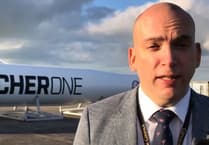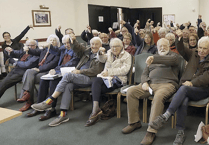A scientist whose research has helped lead to advances in fields as diverse as television screens and medical diagnosis has been given a knighthood.
Professor Roy Sambles is a Professor in Experimental Physics at the University of Exeter.
Brought up at Cotehele, he was educated at Callington Grammar School before going on to study at Imperial College London.
During his 46-year career, Professor Sambles has published over 520 scientific papers and has made significant contributions to our understanding of the melting process, spin waves in metals, resistivity of thin metal films, molecular rectification, liquid crystal optics, plasmonics and microwave and acoustic metamaterials.
His early work focused on unravelling, using electron microscopy, the fundamentals of melting and evaporation of metal particles. He then went on to explore Conduction Electron Spin Resonance and provided definitive studies at low temperatures of spin waves in alkali metals. Later in his career, he also opened up research into natural photonics where his pioneering studies of the photonic structures in butterfly wings paved the way for new research in this area.
The research carried out by his group has had applications in liquid crystal displays for televisions and computer displays, highly sensitive detection of materials (for example for medical diagnosis), and optical and microwave communication.
In 2012 he was awarded the Faraday Medal for his pioneering research in experimental condensed matter physics.
His citation at the time read that he had “an unusually broad record of pioneering research, which he has then passed on to younger colleagues to allow them fully to develop their own careers.”
Since 2014 Professor Sambles has led an Engineering and Physical Sciences Research Council (EPSRC) Doctoral Training Centre in Metamaterials, supporting more than 80 PhD students over an eight-year period. He was a Council member of the EPSRC from 2008 to 2014 and he served on the Defence Science Advisory Committee from 2005 to 2011, sitting on the Board of the Counter-terrorism centre from 2006 to 2013. He was a member of the 2014 REF Physics panel and is currently chair of the Royal Society Research Grants Board.
Sir Roy receives his knighthood alongside fellow scientists, authors, sportspeople and entertainers including household names such as Mary Berry and Tommy Steele.




